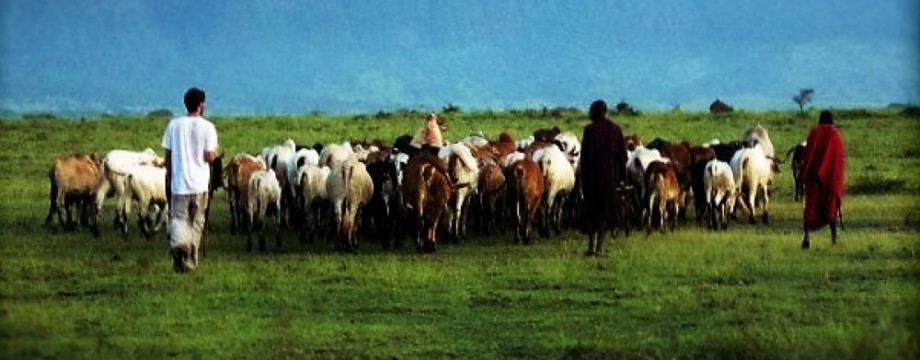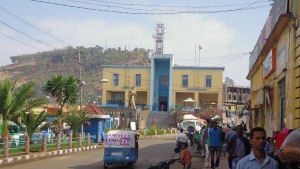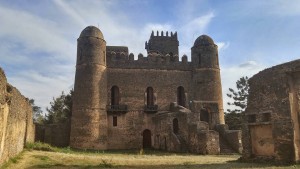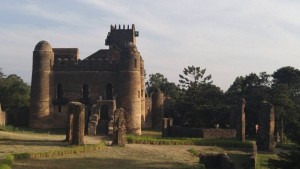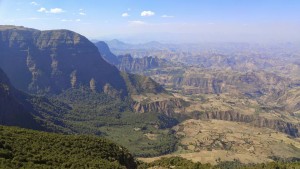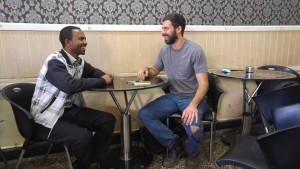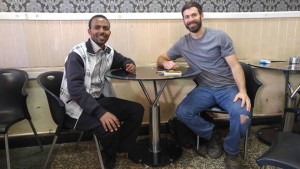It was a scorching hot Saturday afternoon in Gondar. The trendy downtown Tele Café was doing a brisk business. One look at the crowd revealed that many of its patrons, like me, sought refuge from the oppressive heat of the city’s smog choked streets. It was as welcoming a place to take a break as an oasis. As I entered the café I scanned the crowd for familiar faces. Sal, who was sitting at a table with his friends, met my eyes and rose to shake my hand. With a broad grin on his face he greeted me and asked how I was doing.
Sal is the manager of an upscale hotel that I had visited for dinner one night in town. To ensure that I got home safe, he took it upon himself to call me a rickshaw rather than letting me hail one from the street. While waiting for it to arrive Sal and I struck up a lively conversation. He spoke English better than any other Ethiopian I’d met in Gondar, but beyond that he was also intelligent and spoke knowledgeably about the country’s history. It wasn’t until after we parted ways that I started wondering if there might be an opportunity for us to meet again. Since Sal had called the taxi driver to pick me up on his cell phone, I was intent on using my crude Amharic to ask my rickshaw driver for his number. At first the driver seemed a bit disappointed that I wasn’t asking for his own number, but once I got him to understand my request he quickly complied.
So it was that we had arranged a meeting on that particularly equatorial afternoon. After saying hello, we made our way to the table. He asked about my health, remembering that the night I had met him I was just getting over a cold and had ordered ginger tea with honey. While I was a little surprised by his thoughtfulness, there is a definite difference between my own culture and the more elaborate greetings of Ethiopians. He used this topic to segue into a funny story to break the ice. He said that his brother puts stock in an old superstition that the congestion of a head cold can be brought on by smelling a really awful smell. His brother is from the country, but he must be terrified to walk down the street in the city or he’ll catch a cold with every sewer drain he passes. We both had a laugh at that.
The first thing I asked Sal was whether he was comfortable with me jotting down notes about our conversation, and whether he would be comfortable with me posting any of this online. I wanted to make sure that he knew how I intended to use his ideas and stories, and to be forewarned about what he was getting himself into. Even though he consented to everything, I have still changed his name just to be on the safe side. Ethiopia does not have a free press or anything like the first amendment. The government has been known to monitor online communications, and they don’t take kindly to dissenting views. Judging by Sal’s reaction to my questions, he appeared completely unconcerned.
I didn’t want to ask Sal anything that could get him into trouble, so I started out by asking innocuous questions about his age and how old he was when he first started studying English. Sal launched into his life’s story without any further prompting. His narration began with early childhood and continued into the present day. Sal is 26 years old, which makes us very close in age. He was born in a small village with no name, known only in relation to the nearby town of Debark about 3 hours away. Having passed through that region, I would already consider Debark to be a small, remote village in its own right. It’s hard to imagine growing up in a place where Debark is the biggest urban development around. What Debark lacks in population it makes up for in natural beauty and perfect tranquility. Not long beforehand I took an overnight backpacking trip into the Simien Mountains, a place I had previously known only in daydreams and almanacs. On the way there I passed through Debark at the mouth of the trail, the gateway to a vast and untamed wilderness. It is way up in the highlands connected to the rest of the world by a single strand of dirt road.

Trying to imagine what life was like for Sal growing up is a little bit like imagining what it would be like to take part in a lunar expedition. It’s an entirely different world. His whole village has less people than there were students in my hometown high school. Sal’s parents were farmers. As soon as they could they sent him off to the big city to find work. He moved to the nation’s capital, Addis Ababa, and became a waiter. He not only had to fend for himself in the city, but he was also expected to send money home to his parents and 3 siblings. Sal recalled being responsible for providing food, uniforms, books, and more for his brother and two sisters. His salary at that time was 1,800 Ethiopian Birr per month. That is equivalent to roughly $82 a month in USD. With a tinge of shame I realized that I would be spending roughly the same amount on my hotel for the night.
After a while the urgency with which Sal began his life story began to wind down. While he was describing his current position as hotel manager I was able to interject. Listening to the triumphant stories of Sal’s achievements and personal backgrounds was truly fascinating, but with limited time I wanted to steer the topic of conversation towards history. As I polished off my third macchiato (or as it says on the menu makeato) and Sal sipped his own drink, I asked him who the leader of Ethiopia was when he was very young, going as far back as he can remember. He replied that it was Mengetsu.
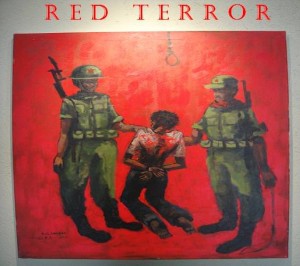
The Derg (Meaning Counsel), Lead by Mengitsu, Launched a Campaign Known as the Red Terror Against A Rival Political Faction
Mengetusu is an infamous figure in modern Ethiopian history. Currently memorialized in the “Red Terror” museum in Addis, the socialist revolution that brought him into power left a legacy of suffering for many Ethiopians. Knowing the controversial nature of this topic, I was taken aback by the degree of trust that Sal was showing in me by simply being willing to mention it. I immediately felt that I had hit on something big. Here was a sliver of Ethiopia’s turbulent history invoked by the words on someone who lived through it.
Right there in the café, the iconic setting of bourgeois revolution, Sal painted for me a grim picture of the cost of political unrest hidden between the lines of every history textbook. He recounted how as the fighting intensified, the losing armed forces fled into the countryside to escape the advancing army. As soldiers scattered afield and the victors advanced to hunt them down, the mountains became a battlefield. This put Sal’s family and entire community in jeopardy. Although he was young, he can vividly recall seeking shelter with family and friends inside a nearby cave, hoping and praying that the soldiers wouldn’t stumble upon it. He remembers seeing a grief stricken woman hide her newborn baby under a plastic barrel. While struggling to find the words to describe the scene, he turned over a plate on the table to demonstrate. I asked with apprehension if the baby was okay, fearing for the worst. To cover a baby with plastic of any kind strikes me as a terrible idea. He responded that the baby was fine. In fact, Sal knows the guy that the baby grew into and they still keep in touch.
I wondered what the reaction was in Sal’s village to the instatement of the Derg regime led by Mengetsu that marked the event. Was the mood festive? He responded that the village remained quiet and somber. There was no cheering, no fireworks, no celebration.
Perhaps afraid that he had revealed too much, Sal swiftly changed the subject and launched into a diatribe about the history of a nearby religious site. He wanted to take me there because a religious holiday would be coming up in a few days that centers on that site. During the course of Sal’s career in hospitality he had been trained as a tour guide, and was certainly well versed in local history and lore. Although I would have liked to expand on my previous inquiry I couldn’t help but be captivated by his description of the site, however off topic it might have been.
As our discussion drew to an end, I found myself wishing that we had more time. When I called for the bill, it was nice to see that Sal had limited himself to one drink even though it was easy to anticipate that I was paying. After dealing with so many tour guides and local travel agencies, it was refreshing to meet with someone who was not at all motivated by money. I enjoyed talking with Sal and listening to his stories. It is the way of the traveler to form connections that are as enlightening as they are brief. While these connections can be broken as freely as they are formed, there is the sensation that you are getting the best of somebody under such circumstances and giving the same. A fleeting connection made traveling can feel as though it is the spirit of an entire friendship condensed down into a far shorter time span.

